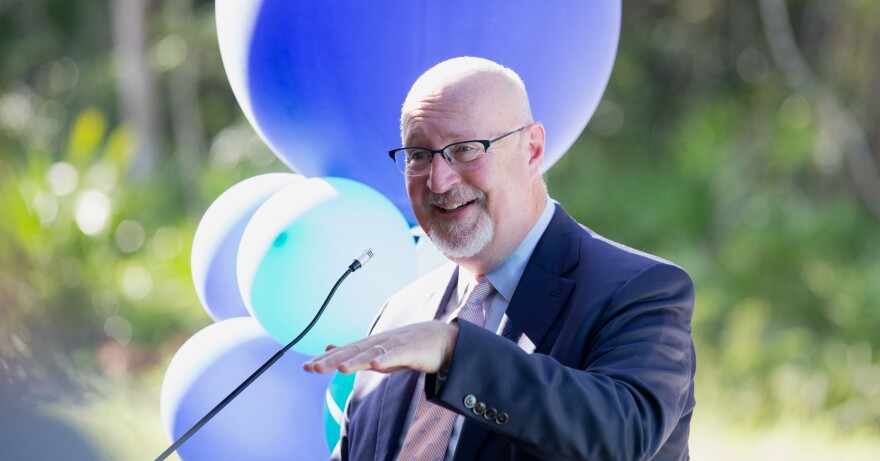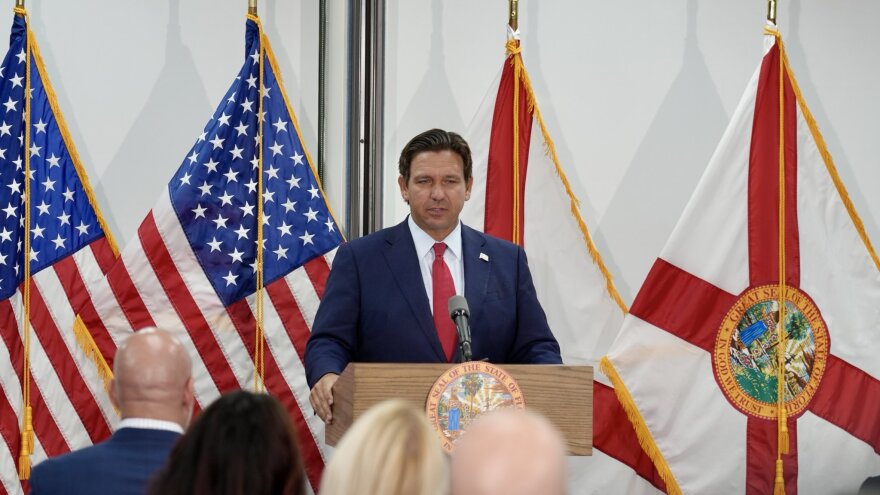Gainesville's mayor is pushing back against accusations that the city is spending money excessively — arguing that it is "fiscally conservative."
This comes after Gov. Ron DeSantis and his administration announced spending audits this week for Gainesville, and Broward and Manatee counties. The audits are part of Florida DOGE's task force.
This stands for the Department of Government Efficiency and is the state's version of a federal effort to slash spending and shrink the size of government. The target is waste, fraud and abuse. But also caught in the crosshairs has been spending related to diversity, equity and inclusion initiatives.
In his announcement of Gainesville's audit, DeSantis said on a social media post that the city hiked taxes on property owners by over 85% in the last four years and that the city budget expanded by nearly $90 million per year, calling it a "staggering increase that far outpaces population growth."
"Despite our DOGE team's requests, the city has failed to explain or justify this spending," DeSantis wrote. "Gainesville taxpayers deserve better from their local government. Our DOGE team, with support from Florida CFO Blaise Ingoglia and his team, will be coming to Gainesville to review their spending practices and procedures."
Governor DeSantis Makes Florida DOGE Announcement in Gainesville https://t.co/6KkFfm2OTc
— Ron DeSantis (@GovRonDeSantis) July 22, 2025
Confusion about the numbers
On "The Florida Roundup," Gainesville Mayor Harvey Ward said his city can't seem to figure out how the state arrived at those numbers.
"My staff has been looking, and I've been asking for several days now," Ward said. "I'm going to assume that there is some way — some angle — that you can look at that might get close, but I really don't understand that."

Ward added that the figures depend on how you're looking, but his staff can't figure out how the state approached the numbers because there's nothing near that.
The mayor said there has been growth in the tax rolls as has every city in the state — adding that it's because property values increased. He said two years ago, the city increased the millage rate by almost one full mill after the Legislature removed its ability to determine a transfer from its utility.
"We've had some adjustments to make and have moved how we pay for things around, but there has not been $360 million work of growth in our budget over the last four years as they've alleged," Ward said.
The mayor said that the general fund in the fiscal year 2020 was about $130 million to $131 million. And that the general fund for fiscal year 2025 is about $155 million.
Ward said that the growth has been primarily in public safety.
"We've increased police salaries, we've changed the way that we compensate our firefighters, while we've cut everything else to the bone," Ward stated.
"I believe we present tremendous value for our neighbors in Gainesville and for the taxes they pay."
The mayor also said most of the city is not taxable because the University of Florida sits in the middle of Gainesville.
"We don't have the luxury of saying, 'Oh, let's spend however we want.' We've always been a very fiscally conservative city," Ward said. "Now, of course, we tend to be a socially liberal city and that's been the case all of my life."
Ward explained how he's lived in the city his whole life and said it always had the reputation of being socially liberal. To him, this means his government is there to serve the will of the citizens.
"I believe we present tremendous value for our neighbors in Gainesville and for the taxes they pay," he said.
Ward added he assumes that since residents have been electing similar people for 40 years to the Gainesville City Commission, they probably want them to keep doing what they've been doing.
"I don't know what the rest of Florida wants because I work for Gainesville," Ward said. "I work for my neighbors in the city of Gainesville and that's what mayors are supposed to do. We're supposed to listen to our community and provide government services based on what our community is looking for and provide some leadership and some direction."
What's next?
Florida's local governments are being told to turn over access to data systems, budget and personnel experts and access to physical premises.
Ward said the state will take action in the city Thursday and Friday.
"We will do everything we can to make available all the things they've asked for," he said.
READ MORE: DeSantis expands local DOGE audits to Manatee while bashing property taxes
The mayor added that the state sent seven pages of notes with some broad and some specific requests.
"We're an open book, and we always have been; certainly more than willing to work with the executive office of the governor and the CFO and provide what they're asking for," Ward said.
What's the criteria for the audits?
According to Alexandra Glorioso with the Miami Herald, based on officials' remarks about the audits, the task force was focusing on places that hadn't passed a resolution supporting DOGE's efforts. Glorioso added that there were 75 jurisdictions in Florida that passed resolutions.
The new chief financial officer, Blaise Ingoglia, said at a press conference announcing an audit into Manatee County that he isn't concerned with an area's political leanings.
"For me, personally, as a fiscal watchdog and as a friend of the taxpayer, it doesn't matter if a county or city is Republican-led or Democrat-led," Ingoglia said. "What matters to me is if you are spending over and above what you should be spending."
WUSF reporter Douglas Soule previously reported how DeSantis said Manatee County's property tax receipts rose far faster than the area's population. This comes as the governor pushes to slash the property tax, which is a change voters must ultimately approve.
You thought we were only auditing blue counties? Guess again.
— Blaise Ingoglia (@GovGoneWild) July 24, 2025
Today, I was proud to join @GovRonDeSantis in launching our @DOGEFLA review of Manatee County.
In order to get real property tax relief, leaders in both red and blue counties need take a serious look at wasteful… pic.twitter.com/BehoeMoWuz
Glorioso said some people believe there are politics at play when it comes to the decision, as Gainesville and Broward County are Democratic strongholds.
WFSU reported that Gainesville's mayor wrote in a reaction later that he expects other historically blue cities and counties to undergo similar scrutiny.
But one thing the state has indicated is that officials are looking at places where there has been modest population growth alongside a large increase in spending.
"Property values are going up all over the state, so spending is bound to be going up all over the state except in areas where there's a steep decline in like some of the rural areas," Glorioso said.
Glorioso added Broward took issue with the way the DeSantis administration calculated how much its spending had gone up. The state said in a letter to Broward that spending had gone up by $450 million a year. However, based on numbers the Miami Herald received, from 2021 to 2024, the county ad valorem taxes increased by $340 million in total.
"So that's significantly less than what the state is accusing them of. We don't know what the right answer is," Glorioso said. "We only know what they tell us, but they did provide us with documents that they shared with the state."
Overall, there are still questions on which cities and counties will be audited and why. But DeSantis has mentioned wanting local governments to follow the state's example on spending models.
"Our state is friendly to taxpayers, and we need to ensure that all local governments are as well," DeSantis wrote on social media.
This story was compiled from interviews conducted by Matthew Peddie for "The Florida Roundup."
Copyright 2025 WUSF 89.7





